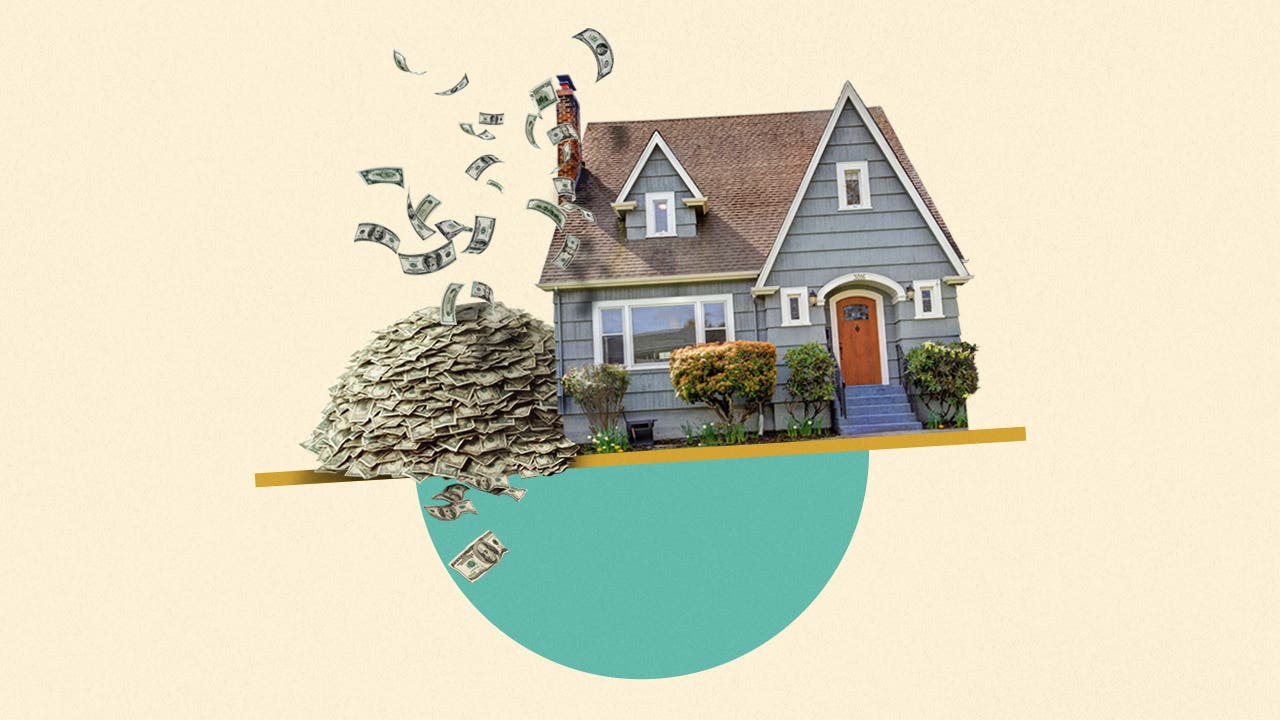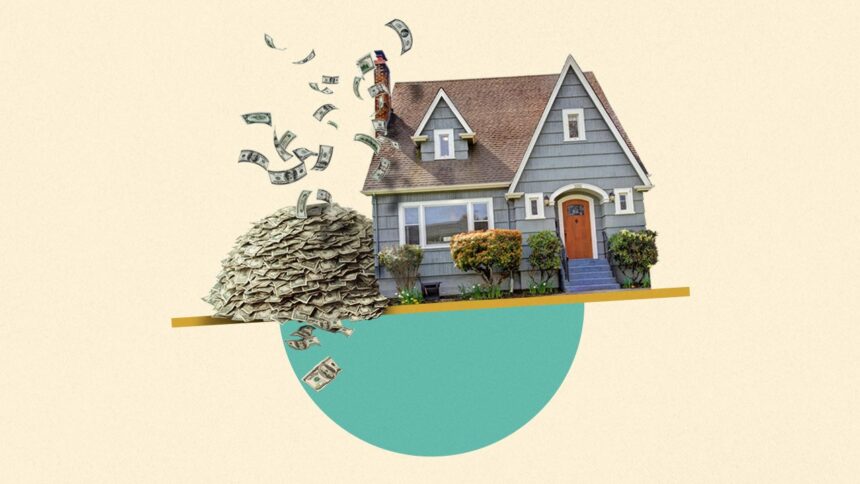
Images by Getty Images. Illustrations by Issia Davis/Bankrate
What is mortgage interest?
Mortgage interest, also known as “financial fees,” is the amount paid to lenders to fund their assets. Interest is expressed as both the percentage of the “interest rate” or “mortgage rate” and the total dollars. When you pay off your mortgage, you will receive a monthly payment that covers both the principal (the amount you borrowed) of the loan and the interest based on the loan. Amortization Schedule.
How does mortgage interest work?
Once you make a monthly mortgage payment, some of that payment is directed towards the principal and other parts of your payment. At the beginning of a loan, most of your monthly payments are interest. As you continue to pay and keep your balance down, your payment increases will shift to principal.
Mortgage Interest Examples
Let’s say you’re going to take your 30-year mortgage at a fixed rate of 6.75% for $320,000. Monthly principal and interest payments are $2,076. Over the 30 years, you will earn $427,185 in interest.
Using Bankrates Amortization calculatorHere’s how your amortization schedule will look for the first year of your mortgage:
| Monthly payment | Main payments | Interest payment | Remaining loan balance | |
|---|---|---|---|---|
| First month | $2,076 | $275.51 | $1,800.00 | $319,724.49 |
| 2nd month | $2,076 | $277.06 | $1,798.45 | $319,447.42 |
| 3rd month | $2,076 | $278.62 | $1,796.89 | $319,168.80 |
| Fourth month | $2,076 | $280.19 | $1,795.32 | $318,888.61 |
| Fifth month | $2,076 | $281.77 | $1,793.75 | $318,606.85 |
| 6th month | $2,076 | $283.35 | $1,792.16 | $318,323.49 |
| 7th month | $2,076 | $284.94 | $1,790.57 | $318,038.55 |
| 8th month | $2,076 | $286.55 | $1,788.97 | $317,752.00 |
| 9th month | $2,076 | $288.16 | $1,787.36 | $317,463.84 |
| 10th month | $2,076 | $289.78 | $1,785.73 | $317,174.06 |
| 11th month | $2,076 | $291.41 | $1,784.10 | $316,882.66 |
| 12th month | $2,076 | $293.05 | $1,782.46 | $316,589.61 |
Most monthly payments cover interest in the first month when loan balances are the largest ever. With each payment, I’m heading towards the principal a little more, but a bit more interested. It will last up to about 20 years after your loan. During the last decade of the loan, the majority of each payment is directed towards the principal. If you pay off your loan completely at the end of your 30-year term known as “maturity,” you won’t be charged any interest.
Current mortgage interest rates
According to Bankrate data, so far in 2025, the mortgage rate averages 6.90% on 30-year loans.
Mortgage interest on different types of loans
While paying interest regardless of the type of mortgage, Fixed or adjustable interest rates. Although it is not very common, you can also opt for an interest-only mortgage.
Fixed-rate mortgage
in Fixed-rate mortgageyour interest rate will remain the same throughout the loan period. Your monthly principal and interest payments will remain the same as the principal and interest portions change over time. Most home loans in the US are fixed-rate loans.
Adjustable mortgage
in Adjustable Mortgage (ARM)Your interest rates often change at preset intervals during the loan period, either once a year or every six months. Most weapons usually have a loan adoption rate for the first 3, 5, 7, or 10 years. After the introduction period, rates will rise or fall depending on the terms of the loan, increasing or decreasing monthly payments.
Interest-only mortgage
Interest-only mortgages are less common than fixed-rate and adjustable loans. This type of mortgage will reduce monthly payments that cover only interest for the initial term. This will save you money ahead of time, especially if you plan to remove your mortgage within a few years. However, if you want to maintain your loan, you will ultimately need to increase your monthly payments, covering both interest and the principal who has deferred payments. If you’re not ready, this could be out of financial control.
April and interest rates
Mortgage interest rates account for only the cost of borrowing funds. Annual rate, or AprilConsider other expenses such as your mortgage interest rate and lender origination fees. point. Like interest rates, APRs are expressed as percentages, but are always higher than interest rates because these other charges are included.
Lenders must disclose the APR of their loan in advance, but it is still important to ask what is included in the APR. For example, some APRs do not include credit reports or valuation fees. Please note that you can try Negotiate some loan feesespecially if you are a capable borrower.
Interest and the Principal
The interest on a mortgage is not the same as that of a principal. The principal is the amount you borrow from the lender. It will cost $320,000, and a lower down payment to cover the home price. In contrast, interest is what the lender is charging you to borrow the total.
How to get the best mortgage rate
To increase the chances of obtaining Best possible mortgage ratefollow these tips:
- Improve your credit score:good Credit score It shows that we have a history of responsibly handling our debts. Work to pay bills on time and lower your scores prior to applying for a mortgage Credit usage ratethe amount of credit you use in connection with your credit limit.
- Building down payment savings: Lenders tend to offer better rates to borrowers that make more declines. Consider automatically putting a portion of your income aside or looking into your savings account to increase the amount you put. Down payment support program.
- Compare rates: Generally, it is best to compare offers from at least three mortgage lenders. A study by Freddie Mac found that borrowers can save up to $1,200 a year by shopping at least four offers.
- Consider a low-credit mortgage: If your credit score is not as high as you would like, you I had a loan. FHA loans can have interest rates of about half or more than traditional loans.
- I’ll work with Mortgage broker: Brokers help you negotiate lower fees, and many people don’t charge them. Find a broker who has experience with the type of loan you’re looking for.
- Payment points: If you are staying at home for a long time and expecting you to refinance for several years, we recommend paying an additional fee known as points to reduce your interest rate. Typically, each point accounts for 1% of the loan amount, reducing the rate by 0.25 percentage points.










